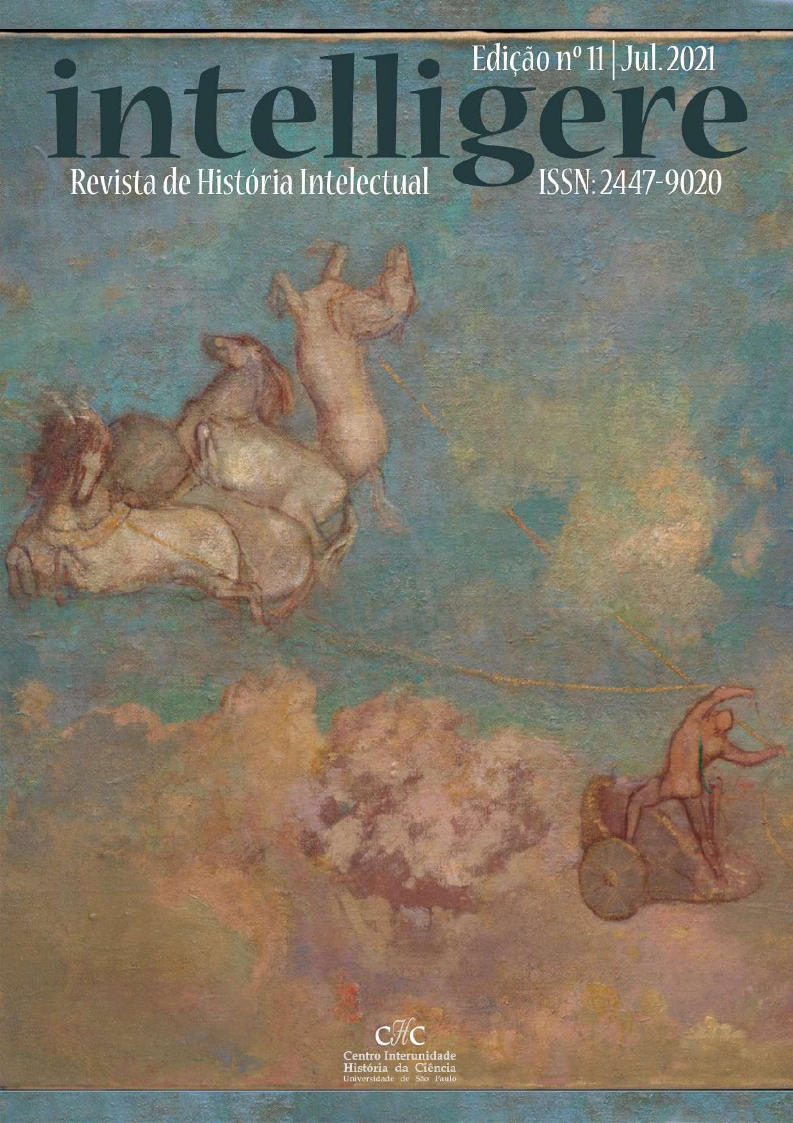Hostis humani generis: metamorphosis of a concept in the revolutionary context
DOI:
https://doi.org/10.11606/issn.2447-9020.intelligere.2021.188727Keywords:
Carl Schmitt, Hostis humani generis, Republic, Robespierre, TerrorAbstract
The goal of this article is to understand how the Republican project is built by putting the friend / enemy distinction at the heart of its speeches and practices. This article has three moments. First, I go back to the origins of the concept hostis humani generis. Next, I analyze how this concept was introduced in the history of political philosophy - first, by Bodin and his definition of the republic; later, by Locke, who, contributing to the consolidation of the narrative of the social contract, creates in his description of the state of nature, the state of war and the civil state, a new way of understanding the relationship between politics and morality, through the insertion of the concept of humanity. In a third moment, I show how this mutation occurs at the time of the French Revolution, especially in the period of the Terror and the “Great Terror” as well as how it became the other side of the Republic.
Downloads
References
ARENDT, H. Entre o Passado e o futuro. São Paulo: Perspectiva, 2016.
BODIN, J. Les Six Livres de la République - un abrégé du texte de l’édition de Paris de 1583. Édition et présentation de Gérard Mairet, Paris,:Librairie générale française, 1993.
DERRIDA, J. "Autoimmunity: Real and Symbolic Suicides", entretien avec Giovanna Borradori. Philosophy in a Time of Terror: Dialogues with Jürgen Habermas and Jacques Derrida. Chicago,:Chicago University Press, 2003, p.105.
GREENE, J. Hostis Humani Generis. Critical Inquiry, 34, no. 4 (Summer 2008), pp. 683-705
EDELSTEIN, D. The Terror of Natural Right - Republicanism, the Cult of Nature & the French Revolution. Chicago: Chicago University Press, 2009.
HOBBES, T. (1651). Leviathan. São Paulo, Pensadores, 1979.
LOCKE, J. Traité du gouvernement civil. Paris: Flammarion, 1999.
LUBAN, D. The Enemy of All Humanity. Netherlands Journal of Legal Philosophy, 2, 2018, pp.112-137
MALTHIEZ, A. La dictature économique du Comité de Salut public. Annales révolutionnaires, T.15, n.6 (Novembre-Décembre 1923), pp.457-481
MAQUIAVEL, N. Le Prince. Paris: Folio, 2007.
MAZEAU, G. Scripting the French Revolution, Inventing the Terror: Marat’s Assassination and its Interpretations. Scripting Revolution, K. Baker et D. Edelstein Ed., Stanford, Stanford University Press, 2015.
RECH, W. Enemies of Mankind: Vattel’s Theory of Collective Security. Leiden-Boston: Martinus Nijhoff Publishers, 2013.
ROBESPIERRE, M. The Project Gutenberg EBook of Discours par Maximilien Robespierre -- 17 Avril 1792-27 Juillet 1794, en ligne le 1er septembre 2009, consulté le 10 mai 2020. URL: https://www.gutenberg.org/files/29887/29887-h/29887-h.htm#17931225
SAINT-JUST, A. Discours sur le Jugement de Louis XVI, prononcé à la convention nationale le 13 novembre 1792 : https://www.antoine-saint-just.fr/textes/13-11-92.html acesso 23 julho 2020.
SCHILLINGS, S. Enemies of All Mankind - Fictions of Legitimate Violence, Hanover: Dartmouth College Press, 2017.
SCHMITT, C. O Conceito do Político. Lisboa: Edições 70, 2015.
SERNA, P. Que s’est-il dit à la Convention les 15, 16 et 17 pluviôse an II ? Ou lorsque la naissance de la citoyenneté universelle provoque l’invention du « crime de lèse-humanité. La Révolution française [En ligne], 7 | 2014, mis en ligne le 03 février 2015, URL : http://journals.openedition.org/lrf/1208 ; DOI : https://doi.org/10.4000/lrf.1208. acesso a 20 de março de 2020.
SERNA, P., Barère, penseur et acteur d'un premier opportunisme républicain face au directoire exécutif. Annales historiques de la Révolution française [En ligne], 332 | avril-juin 2003, mis en ligne le 22 avril 2008. URL : http://journals.openedition.org/ahrf/828 ; DOI : 10.4000/ ahrf.828 . Acesso a 20 de abril de 2020.
SIMONIN, A. Le déshonneur dans la république, une histoire d l’indignité 1791-1958, Paris: Grasset, 2008.
WAHNICH, S. L'étranger dans la lutte des factions. Mots, n°16, mars 1988. Numéro spécial. Langages. Langue de la Révolution française. pp. 111-130.
DE WILDE, M., Enemy of All Humanity: The Dehumanizing Effects of a Dangerous Concept. Netherlands Journal of Legal Philosophy 2, 2018, pp.158-175
Downloads
Published
Issue
Section
License
Copyright (c) 2021 Marta Nunes da Costa

This work is licensed under a Creative Commons Attribution 4.0 International License.
Autores que publicam em Intelligere concordam com os seguintes termos:
- Autores mantém os direitos autorais e concedem à revista o direito de primeira publicação, com o trabalho simultaneamente licenciado sob a Licença Creative Commons Attribution que permite o compartilhamento do trabalho com reconhecimento da autoria e publicação inicial nesta revista.
- Autores têm autorização para assumir contratos adicionais separadamente, para distribuição não-exclusiva da versão do trabalho publicada nesta revista (ex.: publicar em repositório institucional ou como capítulo de livro), com reconhecimento de autoria e publicação inicial nesta revista.
- Autores têm permissão e são estimulados a publicar e distribuir seu trabalho online (ex.: em repositórios institucionais ou na sua página pessoal), com reconhecimento da autoria e publicação inicial nesta revista.




